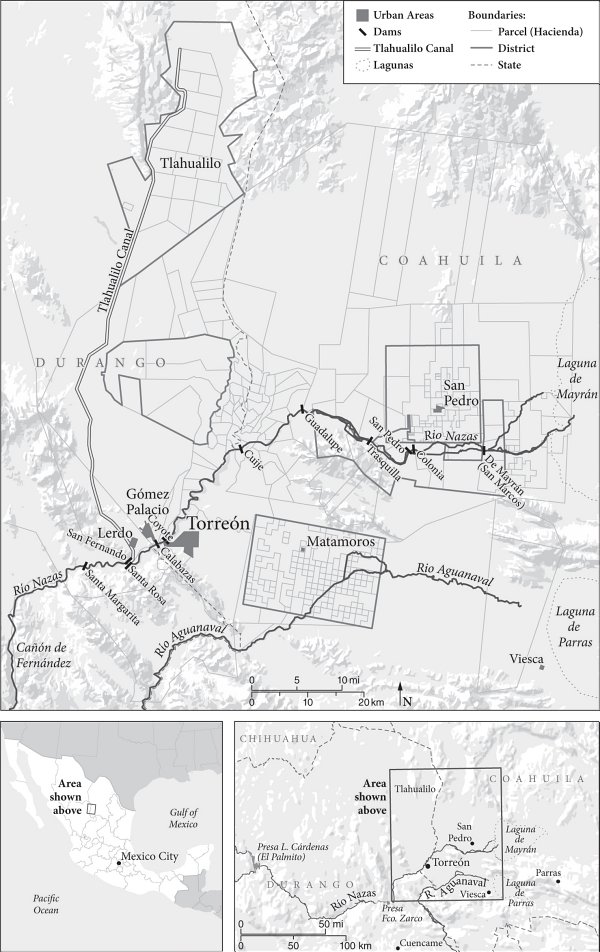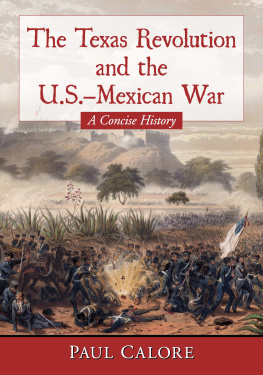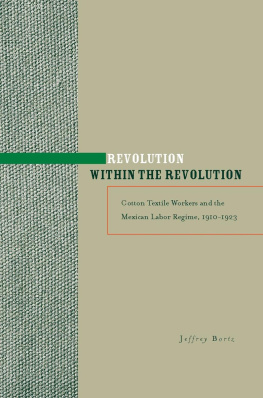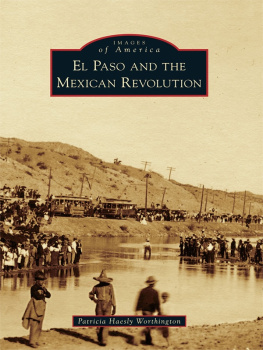Watering the Revolution
An Environmental and Technological History of Agrarian Reform in Mexico Mikael D. Wolfe
Duke University Press | Durham and London | 2017
2017 DUKE UNIVERSITY PRESS All rights reserved
Printed in the United States of America on acid-free paper
Interior designed by Courtney Leigh Baker
Typeset in Garamond Premier Pro by Typesetter, Inc.
Library of Congress Cataloging-in-Publication Data
Names: Wolfe, Mikael, author.
Title: Watering the Revolution : An Environmental and Technological History of Agrarian Reform in Mexico / Mikael D. Wolfe.
Description: Durham : Duke University Press, 2017. | Includes bibliographical references and index.
Identifiers: LCCN 2016058123 (print) | LCCN 2017004587 (ebook)
ISBN 9780822363590 (hardcover : alk. paper)
ISBN 9780822363743 (pbk. : alk. paper)
ISBN 9780822373063 (e-book)
Subjects: LCSH : Land reformMexicoLaguna RegionHistory20th century. | Water-supply, AgriculturaMexicoLaguna RegionHistory20th century. | AgricultureMexicoLaguna RegionHistory20th century. | Agricultural innovationsMexicoLaguna RegionHistory20th century. | AgricultureEnvironmental aspectsMexicoLaguna Region20th century.
Classification: LCC HD 1333. M 62 L 38 2017 (print) | LCC HD 1333. M 62 (ebook)
DDC 333.9100972/41dc23
LC record available at https://lccn.loc.gov/2016058123
Duke University Press gratefully acknowledges the support of Stanford Universitys School of Humanities and Sciences, which provided funds toward the publication of this book.
Cover art : Diego Rivera, Water, Origin of Life (Water reservoir), 1951. Lerma hydraulic works, Chapultepec Park, Mexico City. Photo: 2017 Banco de Mxico Diego Rivera Frida Kahlo Museums Trust, Mexico, D.F. /Artists Rights Society ( ARS ), New York/Schalkwijk.
To my parents

MAP. FM.1. Detailed map of the Laguna region showing the Nazas and Aguanaval rivers flowing through urban and agricultural areas with demarcation of property boundaries. Adopted from a map of 1914 made by the Torren-based German-American engineer Federico Wulff.
Contents
This book started as a dissertation more than a decade ago at the University of Chicago. My dissertation chair, Emilio Kour, was an exemplary mentor, always supportive but also giving me the pointed criticism I needed. I thank him and my other dissertation committee members Claudio Lomnitz, Dain Borges, and Christopher Boyer for their critical support as I made the transition from graduate student to assistant professor. As a fellow environmental historian of Mexico, Chris has been both a mentor and collaborator over the years. I also thank my cohort of graduate students, postdoctoral fellows, and colleagues at the University of Chicago; University of Notre Dame; University of California, San Diego ( UCSD ); University of California, Los Angeles ( UCLA ); and Stanford University, among others, for their critical feedback on the dissertation or the book manuscript. If I tried to list here the dozens and dozens of you, I am afraid I would inadvertently fail to include everybody, so I prefer to express my gratitude to all of you collectively.
I am grateful to the archivists and librarians of the following who helped me locate a wide variety of primary sources: Archivo General de la Nacin, Archivo Histrico del Agua, Archivo Agustn Espinoza de la Universidad Iberoamericana, Archivo Municipal de Torren, Archivo Marte R. Gmez, Archivo Calles-Torreblanca, U.S. National Archives and Records Administration, Archives Center of the Museum of American History (Worthington Corporation Records), the Rockefeller Archive Center, Biblioteca Lerdo de Tejada, Hemeroteca Nacional, Hemeroteca El Siglo de Torren, and Hemeroteca La Opinin de Torren. I express special thanks to two Mexican colleagues and friends: Luis Aboites and Sergio Corona Pez. Luis piqued my interest in los usos sociales del agua. His pioneering scholarship on Mexican water history was an inspiration for this book. Sergios prolific scholarship was crucial to my understanding of the Laguna as a region with a history and identity since at least the late sixteenth century. Over the past decade, he has provided me with invaluable feedback and materials, including maps and photos for this book, and, more important, close friendship.
I thank my editor at Duke University Press, Gisela Fosado, for her professionalism and enthusiasm as she shepherded my book manuscript through the long peer review and revision process. My two anonymous peer readers helpfully and constructively critiqued my manuscript, helping me improve it immeasurably.
I acknowledge support from the Fulbright Garca-Robles Fellowship in Mexico, the Quinn Family Foundation Fellowship through the University of Chicagos Department of History, the Visiting Fellowship at the Kellogg Institute for International Affairs at the University of Notre Dame, the Visiting Fellowship at the Center for U.S.-Mexican Studies at UCSD , and the Mellon Visiting Assistant Professorship at UCLA . I also thank Debra Satz, senior associate dean of the humanities and sciences at Stanford, who helped defray publishing costs.
My late father, Alan S. Wolfe, would have been proud to see this book in print. He encouraged me to pursue a career in academia, and although he did not live to see how it turned out, his spirit lives on. My maman, Marie-Pierre; sister, Marika; and brother-in-law, Peter Hohn, gave me much love and encouragement over the many years of researching and writing this book. Peter read through the entire dissertation and book manuscript and did a superb job of thoroughly editing the latter.
My wife, Yovanna Pineda, helped me in myriad ways with much love, advice, and patience to complete this book. Our daughter Vivianne was born soon after I submitted the manuscript for peer review, her delightful little smile bringing me great joy as if she approved every revised line of the manuscript.
AHA | Archivo Histrico del Agua (Historical Water Archive) |
CCM | Confederacin Campesina Mexicana (Mexican Peasant Confederation) |
CEMEX | Cementos Mexicanos (Mexican Cement Company) |
CFE | Comisin Federal de Electricidad (Federal Electricity Commission) |
CNA | Comisin Nacional del Agua (National Water Commission) |
CNC | Confederacin Nacional Campesina (National Confederation of Campesinos) |
CNI | Comisin Nacional de Irrigacin (National Irrigation Commission) |
CROM | Confederacin Regional Obrera Mexicana (Regional Mexican Labor Confederation) |
CTM | Confederacin de Trabajadores de Mxico (Workers Confederation of Mexico) |
DDT | Dichlorodiphenyltrichloroethane |
GDP | gross domestic product |
ISI | import substitution industrialization |
LALA | La Laguna Dairy Company |
NAFTA | North American Free Trade Agreement |
PAN | Partido Accin Nacional (National Action Party) |
PNR | Partido Nacional Revolucionario (National Revolutionary Party) |
PPACL | Pequea Propiedad Agrcola de la Comarca Lagunera (Small Landholders of the Laguna Region) |
PRD | Partido de la Revolucin Democrtica (Revolutionary Democratic Party) |
Next page




